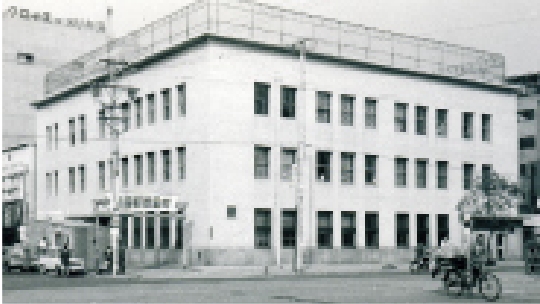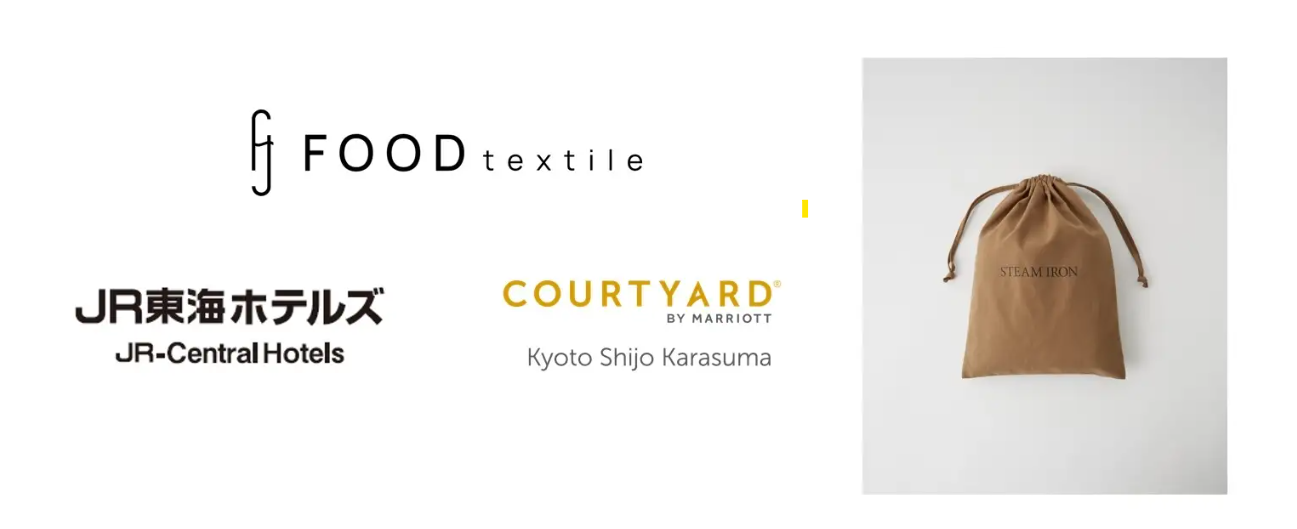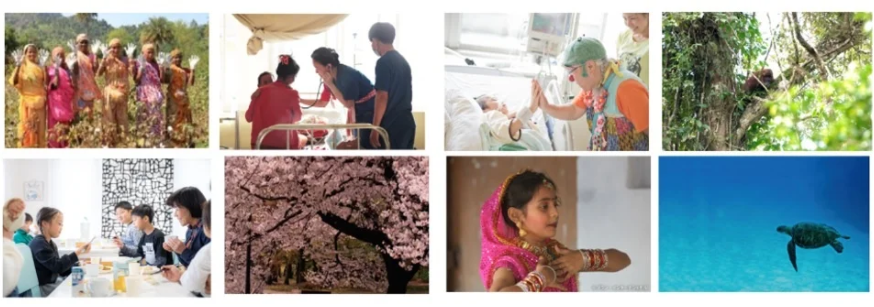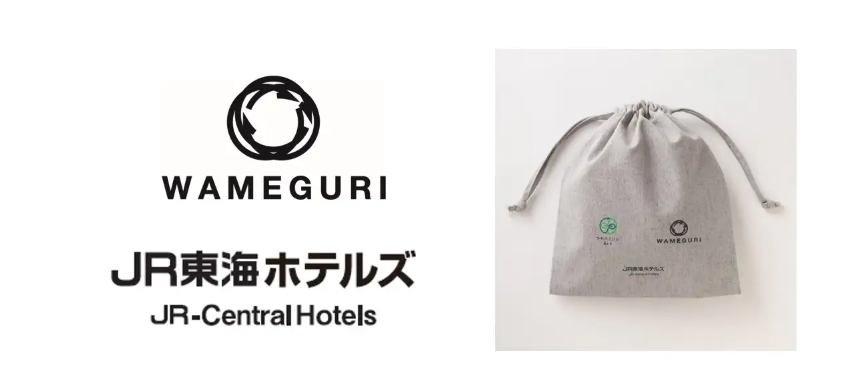We conducted a survey on "organic products".
【Survey Background】
In recent years, awareness and interest in environmentally friendly lifestyles, corporate activities, social contribution activities, and ethical consumption (ethical consumption) have been spreading. The purpose of this event was to grasp consumers' awareness and intention to use organic products that are highly related to the environment and can be easily picked up by consumers, and especially in the fashion field, where trends change rapidly.
[Survey result summary]
◆ 68.9% of those who wish to purchase organic products
◆Tend to have a high usage rate for food and skincare. Clothing will be the focus of organic products in the future
◆Organic cotton recognition rate is over 70%. Recognition rate is increasing
◆ About 80% (76.3%) are interested in the origin of raw materials for clothing.
In the future, not only the design but also the raw materials will be a point of attention?
More than 40% use organic products, about 70% want to purchase
When asked, "Do you usually use organic products?", the total of those who answered "Actively use" and "Sometimes use" was 42.1%, more than 40%. was found to be in use. Regarding future purchase intentions, 57.1% answered “I would like to use it if possible”, and combined with “I would like to use it”, the total was 68.9%. About 70% are thinking about purchasing organic products in the future, and interest in organic products is increasing. I can see that.
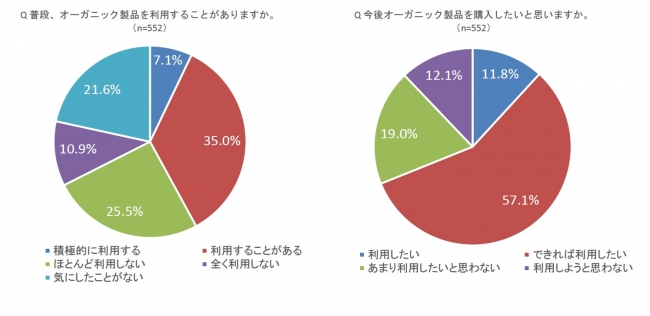
Next, when asked about the genre of organic products used, it was found that "vegetables/fruits" was 68.1% and "skin care/body care" was 50.9%, indicating that food and beauty-related use rates are high. . again, Regarding the genre of organic products that they would like to purchase in the future, 57.6% said “clothing”., and the current usage rate of 30% has increased significantly, exceeding the level of skin care. Up-and-coming organic products I understand that it is.

Recognition rate of organic cotton is over 70%
Cotton is the main raw material for organic clothing. Regarding the question "Do you know organic cotton?", 31.2% of the total answered "I know" and 46.2% answered "I have heard of the name." More than 70% (77.5%) of people know about organic cotton I understand.
In the same survey in 2016, the recognition rate was 60.6%, and in 2017 it was 69.5%, Organic cotton is widely recognized, with an increase of 8 points or more for the second consecutive year. It can be said that it has been done.
Next, when asked about the image of organic cotton, the top answer was "good for the body and skin" (63.4%), and the second was "good for nature and the environment" (49.3%). While the correct image of being eco-friendly spreads, it turns out that people have the wrong image of being "friendly to the body and skin."
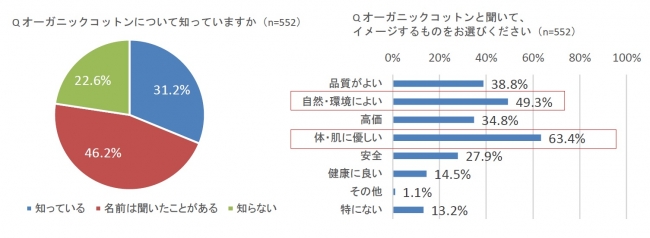
When asked if they understood three items in order to investigate the correct understanding of organic cotton in more detail, those who did not know that organic cotton is “the same as ordinary cotton at the raw material stage” answered that the overall It turned out to be 64.1%. On the other hand, more than 50% (51.7%) of the respondents answered that they "know" or "vaguely know" the item "Aiming to improve environmental pollution and preserve the health of producers." I was. Although the understanding of organic cotton is progressing, it can be seen that it is only partial.
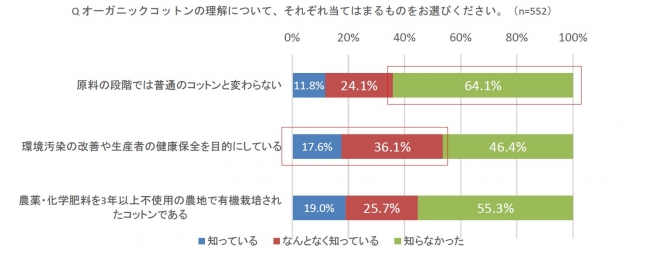
Organic fashion emphasizes quality and brand, about 80% are interested in the country of origin
When asked about the points to choose when purchasing organic products in three genres of particular interest, "price" was ranked high in all of them. Looking at the results for clothes individually, "Quality" (39.9%) and "Brand" (15.9%) scored higher than food and beauty products, and interest is particularly high. I understand. When choosing organic fashion, trust in brands and products is one of the important indicators I can see that.
Next, in response to the question, "Do you check the country of origin of materials when purchasing clothes?", the total of those who answered "always check" and "sometimes check" was 58.2%. I would like to do so but have not been able to confirm” (18.1%), About 80% of people are interested in the origin of clothing It became clear.
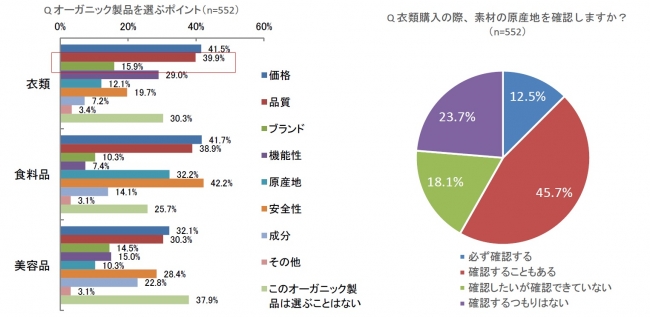
Will clothes and bedding be the hottest cotton products in the future?
Next, regarding organic cotton, when asked about the products they usually use and the products they would like to purchase in the future, it was found that “towels” had a high usage rate of 41.9%. In terms of future hopes, "Underwear" (21.5%→52.5%), "Clothes" (10.5%→21.0%), and "Bedding" (11.7%→29.7%) are more than double the usual usage rate. It is speculated that this is a genre that will be attracting attention as an organic cotton product in the future.
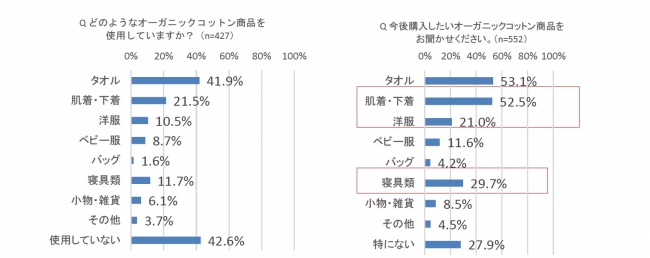
More than 50% answered that “use of organic cotton = image improvement”
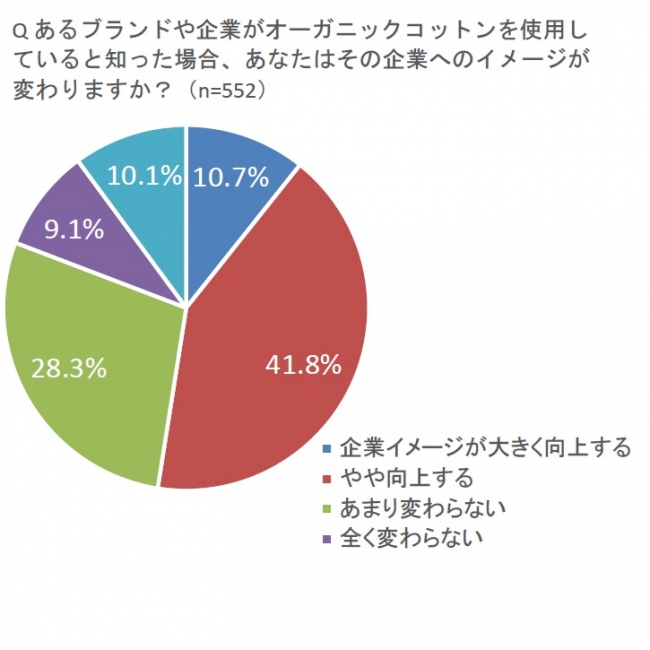
When asked, "If you learned that a brand or company is using organic cotton, would your image of that company change?" %, 41.8% answered that they would improve somewhat, and 52.5% of all answered that they would improve.
In recent years, as consumers have become more socially conscious, such as the pursuit of socially and environmentally friendly product selection and lifestyles, the use of organic cotton, which is one of the raw materials, is affecting the image of companies and brands. It is considered.
[Survey Overview]
・Survey method: Internet research
・Survey subject: 552 men and women aged 20~69
・Survey area: Nationwide
・Survey period: July 25, 2018 ~ August 1, 2018
[Reference]
In response to the results of this survey, it was found that interest in organic products is increasing, and organic clothing is attracting attention among them. In addition, we found that awareness of organic cotton, a representative material in the fashion field, is increasing year by year. On the other hand, it can be said that the level of understanding is still developing.
TOYOSHIMA, whose ancestor is cotton and currently operates "Organ Bits", will continue to contribute to the health of cotton producers and the global environment through the spread of organic cotton by developing and selling products using organic cotton, as well as promoting awareness activities and events. In addition, as awareness of organic cotton in Japan increases, we will also promote dissemination activities to accurately convey information about organic cotton.
What are earth- and people-friendly organisms?
"Organic cotton promotion project with the largest number of apparel brands in Japan"
Cotton cultivation, which is used as a raw material for clothing, uses about 15% of the pesticides and 7% of pesticides used worldwide*, which is combined with many environmental and social problems, such as the large use of pesticides, soil pollution, and health hazards to farmers. On the other hand, organic cotton is organic cotton on farmland that has not used any pesticides or chemical fertilizers at all for more than three years. The widespread use of organic cotton is expected to reduce the number of traditional cotton cultivation methods and improve problems in the world's production areas.
"Organbeats" is an organic cotton promotion project that began in 2006 with the desire to contribute to the global environment and producers "little by little" by everyone. In order to make it easier for organic cotton to be used and popularized, about 100 brands are currently participating in the "reversal idea" of delivering 100% of the products to 100 times more people without sticking to the amount of 100% used in one garment, and a total of more than 6.84 million items have been produced. The activities have expanded to support farmers and NPOs in the countries of origin, and the circle of social contribution activities that can be participated in on a daily basis through a single piece of clothing has also expanded.
(*Source: Textile Exchange)
[Ogarvitz official website] http://orgabits.com/
[Orgavits Facebook page] https://www.facebook.com/orgabits/
Company Profile
・Company Name: Toyoshima & Co., Ltd.
・Established: June 27, 1918 (Founded: 1841)
・Representative: President Hanshichi Toyoshima
・Location: 15-15, Nishiki 2-chome, Nakaku, Nagoya, 460-8671, Japan (Nagoya Head Office)
2-1, Kanda-iwamotocho, Chiyodaku, Tokyo, 101-0033, Japan(Tokyo Head Office)
・Main business: Wholesale of various textile products (from cotton, wool and other materials to raw yarns, textiles, and products),
Import and export and trilateral trade


